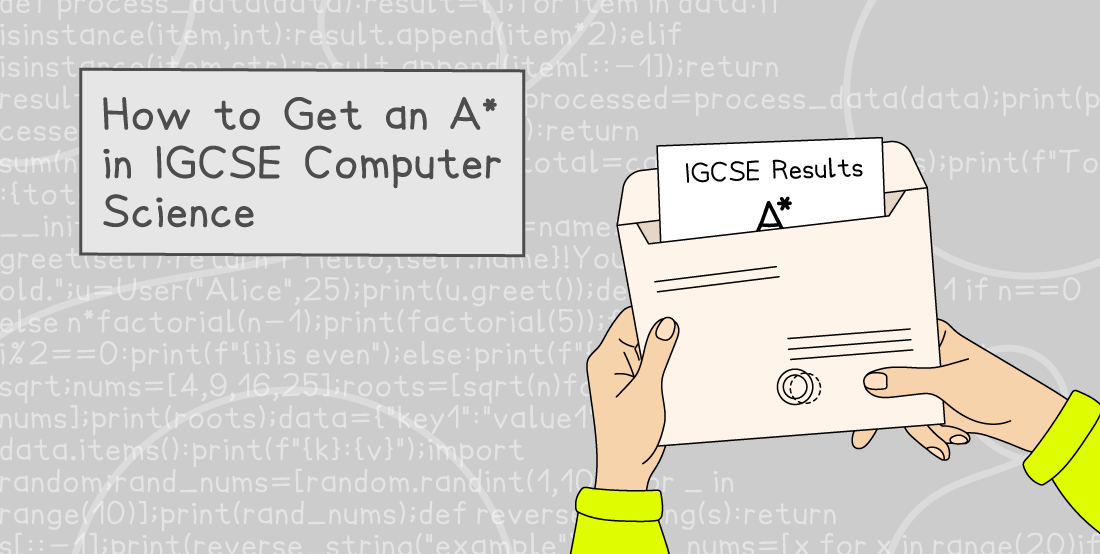How to Get an A* in IGCSE Computer Science
Written by: Robert Hampton
Reviewed by: James Woodhouse
Published

Contents
If you're aiming for an A* in IGCSE Computer Science, this guide will show you exactly how to get there. Success in IGCSE Computer Science isn't just about memorising facts — it's about understanding how computers work, solving problems logically, and applying what you've learned in different contexts. In this article, you’ll learn the strategies that top students use to secure the highest grade.
Know what the exam is really testing
IGCSE Computer Science students who get top marks know the difference between learning content and learning how to use that content in an exam. Your first step is to break down the syllabus:
Learn key terms and definitions
Understand the structure of both Paper 1 (theory) and Paper 2 (practical/problem-solving)
Identify the command words (e.g. describe, explain, state)
Turn the syllabus into flashcards or short-answer questions to quiz yourself regularly.
Practice logic and pseudocode every week
Paper 2 in IGCSE Computer Science is where many students drop marks. To get an A*, you need to be confident with algorithms, trace tables, and writing pseudocode.
Here’s a typical pseudocode structure you should be comfortable with:
FOR i ← 1 TO 5
INPUT score
total ← total + score
NEXT i
average ← total / 5
OUTPUT average
Don’t just study syntax, practise creating your own algorithms to solve mini problems (e.g. finding the highest number, checking for prime numbers).
Use mark schemes to learn how to write answers
For Paper 1, many of the questions are explain-style or multi-step. Top students know that writing full, precise answers using correct terminology is key.
Look at past papers regularly
Study how marks are awarded
Practice timed answers and self-mark using the official mark scheme
Keep a notebook of model answers and common mistakes to revise from.
Revise actively, don’t just re-read
A* students don't just highlight notes, they interact with the content.
Try:
Teaching the topic to a friend or family member
Creating mind maps or flowcharts
Completing questions from different topics back-to-back
This builds deeper understanding and helps with exam-style thinking.
Common Mistakes to Avoid
1. Ignoring Paper 2 until the end
Many students focus heavily on theory and leave the practical side of the course until the final weeks. Paper 2, however, tests your understanding of algorithms, pseudocode, and logic. If you only practise these topics just before the exam, you won’t be confident enough to score full marks.
To avoid this, practise algorithmic thinking throughout your revision. Use short, timed tasks and past paper questions to build speed and accuracy from the start.
2. Writing vague or incomplete answers
IGCSE Computer Science questions often require specific terminology and detailed reasoning. Students who write general answers without keywords can lose easy marks, even if they understand the topic.
Always read the command word carefully and look at how marks are awarded in the mark scheme. Use precise language and make sure your answers are complete, even for short questions.
3. Revising passively
Highlighting notes or re-reading a textbook might feel productive, but it doesn’t help you remember or apply knowledge. Passive revision leads to gaps in understanding, especially when questions are worded differently from what you’ve seen before.
Switch to active techniques such as answering questions, creating flashcards, or teaching topics to someone else. This makes your revision much more effective and exam-focused.
Boost Your Grades With Save My Exams
Feeling stressed ahead of your exams? Join over 1.5 million students who use Save My Exams, the leading online revision platform.
On average, students who use Save My Exams improve by two grades thanks to our comprehensive resources. From past papers and revision notes to exam-style questions tailored to your specific course, our revision tools help you to study smarter, not harder.
Created by teachers and examiners who know exactly what you need to revise to achieve the best grades, our resources help students to save time and get straight to the content you need.
Sign up for articles sent directly to your inbox
Receive news, articles and guides directly from our team of experts.

Share this article


 written revision resources that improve your
written revision resources that improve your